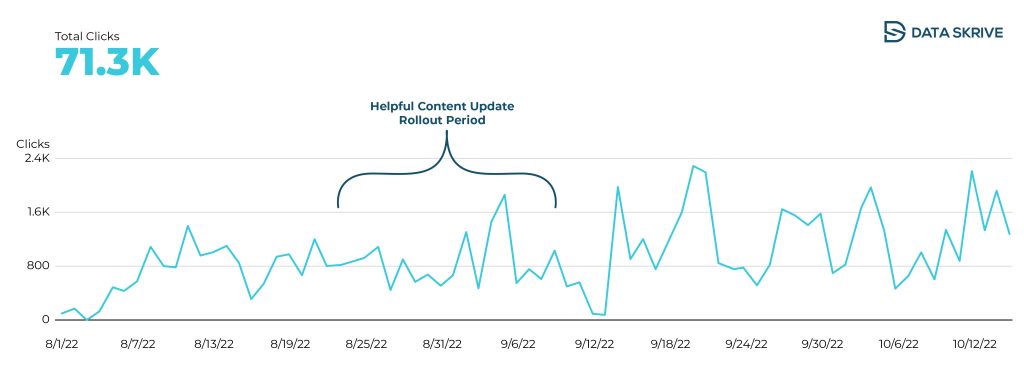We’ve heard it a thousand times, in a hundred different ways: “Google hates automated content. What makes yours different?”
“What about Google’s Helpful Content Update? Did sites using Data Skrive content get penalized?”
This article will answer those questions, and clear up some misconceptions about what is “automated content” and what is not, while discussing some of Data Skrive’s content creation secret sauce.
What was the Google Helpful Content Algorithm update?
In late August 2022, Google announced that they would be rolling out a new algorithm update, called the “helpful content update,” focusing on people-first content to answer the question, “Is the content primarily to attract people from search engines, rather than made for humans?”
According to Google, it was also aimed at devaluing automated content, specifically content that provided little added value and was not useful to people.
The update was made to improve the quality of search engine results and weed out mass-generated, non-human written content that was designed to game search engines.
As with any Google algorithm update, especially those that are announced in advance by Google, this caused quite a stir in the SEO community. Google even released a list of 15 questions to answer to ensure that you are creating useful content with humans in mind.
The algorithm change finished rolling out on September 9, and actually turned out to be mostly much ado about nothing. Most websites didn’t notice a difference, although there was impact felt throughout a few categories, such as ringtones, coding, and lyrics.
At the end of the day, however, it’s just more of the same from Google, encouraging publishers to create content that is useful for the reader, and not geared just to game search engines. The gist of this algorithm change, which we can all appreciate, was to help further Google’s mission to surface the most relevant results to users.
Did the Helpful Content update impact Data Skrive content?
In a nutshell, the update did not impact Data Skrive content. In fact, it might have helped. Since our content is tailored to match search intent, while providing clear and related details, our content meets the intended improvements the update was targeting.
Below is a screenshot of MLB betting preview clicks from a customers’ Google Search Console. You can see the period where the Helpful Content update rolled out. There was no noticeable change in traffic during the rollout, a slight lull in traffic a few days after (likely unrelated), then an overall increase in traffic through the end of the season. Overall, we had some pre-rollout concerns expressed by customers. In the end, none reported traffic drops.

What makes Data Skrive different from the other automated content producers?
One of the things Google was planning on doing with this update, which perhaps never completely materialized, was to target the vast amount of AI-generated content that now floods the internet. Have you ever been reading an article, and wondered if the author passed elementary English, or if there was just zero editing done? You were probably looking at AI-generated content. There is still a lot of work to be done before robots can truly replace humans (do we even really ever want this?).
This is especially true in sports. For example, a kill in volleyball has a different meaning outside of the sports world, a birdie in golf is different from birdies in your yard, and a round-tripper in baseball is not traveling roundtrip on a plane. To create anything worthwhile in sports, it needs a human touch. There are companies out there that will claim to “completely automate” sports content, but it might read something like this:
The Buffaloes’ numbers this season are as follows. The franchise has averaged 197.25 passing yards and 3.56 total yards per pass attempt. When it comes to turnover margin, Colorado’s accumulated a value of -0.75 and their average possession this season is 27:28… The Oregon Ducks will have to win by at least the point spread or more to take the bet. Let’s see if their status as favorites is on their side in this duel!
AI-Generated Article
This statement was taken from an AI-generated article. Data Skrive uses seasoned sports journalists to create every sports article, so all of our content has the human touch.
When our customers expressed concern about Google targeting automated content, we took their feedback seriously. It is certainly a valid concern, now and in the future. We did, however, explain that the primary goal of Google targeting automated content is to penalize GPT-3 content (NLG/AI-generated content that is meant to sound like it is written by a human, though often deeply flawed, missing the specific vernacular and colloquialisms fans are used to).
The difference with Data Skrive is that our content is written and curated by actual people. We have a team of experienced sports journalists and editors who craft our content by hand. While Data Skrive automatically assembles articles using machine learning models based on data, the content is actually written for humans, by humans, with each article being unique. The articles are designed and optimized based on domain strength while also accounting for where the content will be consumed (mobile, social, desktop, etc.), and are tailored to our customers’ specific editorial standards so no two articles are the same. In reality, we use raw data and proprietary algorithms to assemble the content, which is automated in a way, but not the way most would think about automation. It is well thought out, user-friendly content that is written by professional writers and optimized to rank organically and fulfill searcher intent.
How does Data Skrive future-proof their content and processes?
We ran all types of Data Skrive-generated content through Google’s 15 questions above to ensure it passes the Helpful Content portion of Google’s algorithm, and it passes every one. We continue to future proof by focusing on searcher intent, answering real and researched search queries, and article uniqueness. We constantly strive to find new ideas for unique article topics and other types of content at scale in new sports and other data-inspired topics everyday.
We have a team of sports enthusiasts, data scientists, writers, and SEO experts to ensure that we stay on top of industry trends and Google algorithm changes, and ensure that our content continues to rank and convert well.



